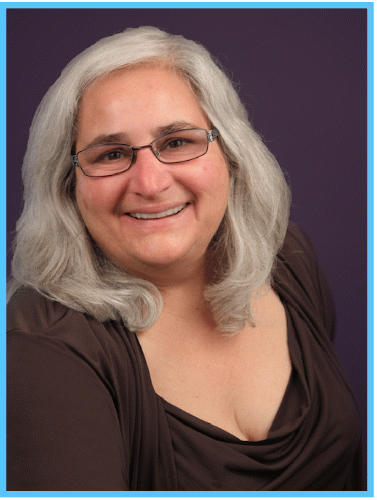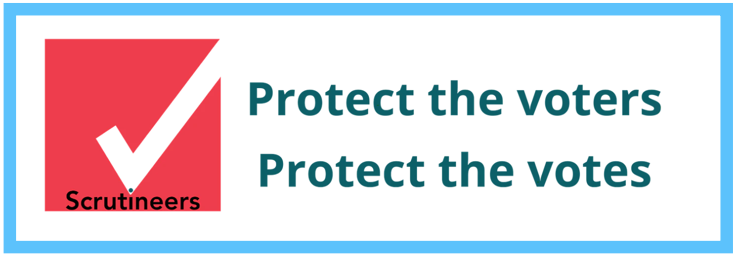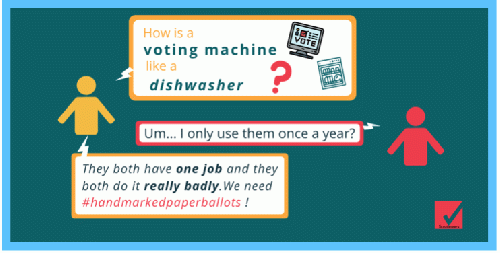| Back OpEd News | |||||||
|
Original Content at https://www.opednews.com/articles/Scrutineers-Connect-The-Do-by-Joan-Brunwasser-Election-Protection_Interviews_Vote-by-mail_Voting-Integrity-200907-88.html (Note: You can view every article as one long page if you sign up as an Advocate Member, or higher). |
|||||||
September 7, 2020
Scrutineers Connect The Dots Between Voting Rights and Election Security
By Joan Brunwasser
I started the Scrutineers community to bring together the voting rights and election security aspects of the election protection movement, to create a place people could learn about the issues and how to take action, and to build a movement. We have over 600 members, a delightful combo of people brand new to the issues, those working on election protection for a year or four, and veterans who've been involved for many years.
::::::::
My guest today is Emily Levy, long-time election protection activist, Founder and Director of Scrutineers.org.
Joan Brunwasser: Welcome to OpEdNews, Emily. What a cool name; it reminds me of a cross between buccaneers and Hercule Poirot! I'm assuming that's not what Scrutineers is. So, please share with our readers what it really is and why you started it.
Emily Levy: Great to be with you, Joan. I think you've got the flavor of what we're doing, more or less, with that comparison. Scrutineer is actually the word used for election monitors and investigators in many other countries. I came across it watching an Australian TV drama.
As you said, I've been working in election protection for a long time. And as we approached this election cycle, I realized some really important needs weren't being filled. For one thing, people focused on voting rights and people focused on election security weren't working together much at all. The voting rights movement primarily focuses on making sure people have and can exercise the right to vote. That work typically ends when the votes are cast. Election security work has centered largely around what happens to votes after they're cast: making sure they're counted accurately. These two parts of the election protection movement clearly need each other, and I wanted to work to build those connections.
The voting rights movement is clearly a movement. It's been around for a couple hundred years and is made up of at least dozens if not hundreds of organizations, and many thousands of people. Election security advocacy work hasn't really become a movement. Fantastic work has been done by a small number of people, most of whom come from tech backgrounds of one sort or another, not from community organizing backgrounds. They've developed effective ways of making elections more secure, and exposing vulnerabilities. But they haven't built the movement needed to put their plans into action all around the country. I wanted to do that, too.
One of the challenges I saw with building that movement was that there wasn't any place for people to go who were new to the cause and wanted to learn about the issues and how to take action.
That's been a challenge always for those of us working on what we used to call "election integrity" and now call "election security" or "election security advocacy." A few years back I helped Jon Simon, author of CODE RED, create a blog post that led people through the basics of the issue. Other than that, there was really nothing.
So I started the Scrutineers community to address all that: to bring together the voting rights and election security aspects of the election protection movement, to create a place people could learn about the issues and how to take action, and to build a movement.
JB: A brilliant concept, really. Kudos! How long has Scrutineers been around and how's it going creating a buzz? Every four years, there is tremendous focus on the presidential election. Yet, journalism as a whole has really fallen down on the job of alerting, educating and engaging our citizens about the dismal state of our elections on so many fronts. How can you succeed when corporate media, with all its resources, has spectacularly failed?
EL: Thank you, Joan. Scrutineers launched in January 2020, and I've been really pleased at how quickly a buzz seems to be growing, especially when compared with work I've done in this field in the past.
It's frustrating that it's still so hard to get corporate media -- and often even alternative media -- attention on election security issues beyond "Russian interference." The good news is that social media means we don't have as dire a need for their help as we did in the past. We have other ways to bring public awareness to issues. Social media attention can lead to mainstream press attention, and I hope it will when it comes to protecting this year's elections.
JB: So, Scrutineers is really new. What can you tell me about who's signed up so far?
EL: We have over 600 members, with more joining daily. How much time do you have?
Seriously, though, I clearly don't know everyone. But I can tell you it's a delightful combination of people who are brand new to the issues, people who've been working on election protection for a year or four, and veterans who've been involved for many years. Last I checked, we had members in 35 states. There's some diversity of age and race, but not as much yet as we'd like. Those are things we're actively working on and have been from the beginning.
One thing that's been really lovely is discovering that I'd been really underestimating how many people have been following election security issues and taking action where they can.
JB: That's inspiring. Especially for those of us who have spent so many years in the trenches and have gotten understandably weary, cynical and short-tempered. I want to say that I am wild about your website. It's very inviting and informational. Can you talk about how you pulled that off?
EL: Thank you! And if I'm not mistaken, you've only seen the 'cover,' the home page. Most of what's there isn't visible until you join. The site is built on a platform called MightyNetworks, which exists for the purpose of supporting the creation and growth of thriving online communities. It's designed to be an alternative to some of those giant social media sites you may have heard of, an alternative that doesn't advertise to you or collect your data.
So on the inside of the site, it's very interactive. There are discussion boards, events, private messaging, recorded trainings to watch, and small groups we call "Circles." We recently set up a Circle for each U.S. state and territory, though some of them don't have members yet.
This work can get so heavy -- because there's so much riding on it -- that I really wanted the site to have an energetic feel to it. I think we've achieved that.
JB: You have! And now I'm motivated to join. It's going to cost me $1.99 to dig deeper. That doesn't seem like it's going to help you live in grand style. So, what's it for and how did you come up with that amount?
EL: While I know people get tremendous value out of becoming Scrutineers, I didn't want money to be an obstacle to folks joining. I also didn't want to leave the doors wide open by making it free, because that could create the problem of bots signing up. I also thought having a small fee would prevent people from joining to harass us, since the payment makes them more traceable if they make trouble. I originally thought we might add a more expensive membership level, but have found this is working fine. Enough members and supporters choose to donate more that we're now doing OK financially. Of course, if we had more funds we could do even more, and hope to be seeing donations increase as a result of some upcoming changes.
JB: Let's talk about the trainings a bit. What can we learn how to do? How does it help? And how does the new reliance on voting by mail affect this crucial election and Scrutineers' approach?
EL: One of the things that's tricky about doing election protection work is that different approaches are needed in different places. In one community, the most important thing to do might be to rent a flatbed truck and some portable toilets and hang out near a polling place with long lines, providing people with the ability to stay in line as long as necessary to vote.
Somewhere else, the most important thing might be to photograph the poll tapes printed out from each voting machine at the end of election night, and compare those figures to the official election results, looking for discrepancies.
And somewhere else, monitoring post-election processes --like signature matching on vote-by-mail ballots and provisional ballots-- might really be key.
And of course, in most places, more than one type of election protection work is needed. We really need thousands of people doing this work all over the country.
In our membership site, people can connect with others in their state and get help figuring out the most important election protection activities in their community. Or they can connect with folks in a state they're particularly concerned about.
JB: That makes sense.
EL: Some of our trainings are background information everyone will need, like an introduction to the various electronic systems used to count votes and an overview of what election security advocacy entails. Others will apply only in some places, like how digital ballot images can be used by a campaign or a community to provide election oversight.
We've got a training session about how to talk with election officials, because we really want our members to do their best to create good relationships in their local election offices or election boards.
And then there are (and will be more) action-specific trainings, like how to do a public records request, how to count votes on ballot images, how to do phone banking to fight voter suppression, how to photograph poll tapes as part of an election verification project.
We'll be having some training that's specifically designed for poll workers. When you get hired to work the polls in a community, you'll get trained on how to set up the machines, check people in, that sort of thing. We're going to provide supplementary training on how to keep your eyes open for legal and security issues while working as a poll worker.
The way our trainings are organized, you can do the ones that are of interest to you.
You asked how election protection work helps. For one thing, it lets election officials and staff know that the community is watching. In and of itself, that can lead to better practices. The job of running an election is always hard, and it's even harder this year. When you have more to do than you can possibly do well, it's tempting to cut corners. But when the public is watching, you're less likely to do that, right?
Sometimes election protection workers can prevent problems from happening. For example, you might find out that your county isn't planning to print enough paper ballots, and be able to bring pressure in time to get that changed.
In 2016 after the primary election in California, a small team of election monitors discovered an error that was being made in processing the ballots. They spoke up and got that error corrected, and that saved an estimated 66,500 presidential votes from being discarded! Our work can make a huge difference.
Some of what we'll need to do will be different this year because more people will be voting by mail. For example, you may want to advocate for secure drop boxes to be provided in your community for people to drop off their ballots. And because of COVID, some of the monitoring activities may happen remotely with the use of video cameras or screen-sharing. The need for changes like this is one of the reasons we need to start working with our local election officials now, so we can negotiate how the public will be given meaningful access to monitor procedures before, during, and after voting happens.
JB: Wow. You Scrutineers really cover a lot of territory! Good for you! COVID and the constant barrage of bad news for the past three and a half years have made many of us numb and just plain overwhelmed. All of these actions seem hard and time-consuming. How can a person edge into election protection work without being scared off by the daunting number of areas that need attention?
EL: You ask great questions. There are a few ways someone could do that in Scrutineers. One would be to join their state Circle (state subgroup) and focus on what's happening there. Another would be to contribute a skill they have, like doing graphics or video editing or research, which can keep them a bit removed from the fray. It's also possible to come in, watch one or two of our entry level training videos, and decide on a particular focus without necessarily having to learn about all of what's possible. I hope being in an organization that has hundreds of members will help people avoid feeling like they individually have to do everything!
JB: Okay. That sounds doable. Anything you'd like to add before we wrap this up?
EL: Yes. There's something we haven't touched on that makes this year's election very different. In the past, election security advocates have focused on exposing the vulnerabilities in our election system and irregularities that occur in specific elections. This year, we have a very real possibility of seeing baseless politically-motivated claims that the election was stolen. It will be hard to know whether those claims have merit without full transparency of election processes. As my colleague John Brakey of AUDIT Elections USA says, voting must be a private process, but counting must be a public process.
I encourage everyone to vote on a paper ballot if they possibly can. Without hand-marked paper ballots, we have no way to conduct meaningful audits to make sure the election results are accurate. And get ready to participate in public oversight of the election. Scrutineers can help, and there are other groups that can, too. Our democracy really does depend on it.
JB: Thanks so much for chatting with me, Emily. It was great to learn more about Scrutineers. If we each jump in and do one action to protect and preserve our elections, we will all be better off and so will American democracy that we cherish.
***
Find Scrutineers at Scrutineers.org. Follow them on Twitter @ScrutineersUS. Or listen to the Scrutineers Series podcast, a joint project with WhoWhatWhy.org. Search your podcast app for "WhoWhatWhy's podcasts." Episodes and rough transcripts are also posted at WhoWhatWhy.org.
Authors Website: http://www.opednews.com/author/author79.html
Authors Bio:
Joan Brunwasser is a co-founder of Citizens for Election Reform (CER) which since 2005 existed for the sole purpose of raising the public awareness of the critical need for election reform. Our goal: to restore fair, accurate, transparent, secure elections where votes are cast in private and counted in public. Because the problems with electronic (computerized) voting systems include a lack of transparency and the ability to accurately check and authenticate the vote cast, these systems can alter election results and therefore are simply antithetical to democratic principles and functioning.
Since the pivotal 2004 Presidential election, Joan has come to see the connection between a broken election system, a dysfunctional, corporate media and a total lack of campaign finance reform. This has led her to enlarge the parameters of her writing to include interviews with whistle-blowers and articulate others who give a view quite different from that presented by the mainstream media. She also turns the spotlight on activists and ordinary folks who are striving to make a difference, to clean up and improve their corner of the world. By focusing on these intrepid individuals, she gives hope and inspiration to those who might otherwise be turned off and alienated. She also interviews people in the arts in all their variations - authors, journalists, filmmakers, actors, playwrights, and artists. Why? The bottom line: without art and inspiration, we lose one of the best parts of ourselves. And we're all in this together. If Joan can keep even one of her fellow citizens going another day, she considers her job well done.
When Joan hit one million page views, OEN Managing Editor, Meryl Ann Butler interviewed her, turning interviewer briefly into interviewee. Read the interview here.
While the news is often quite depressing, Joan nevertheless strives to maintain her mantra: "Grab life now in an exuberant embrace!"
Joan has been Election Integrity Editor for OpEdNews since December, 2005. Her articles also appear at Huffington Post, RepublicMedia.TV and Scoop.co.nz.





